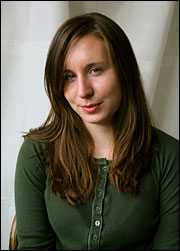For some people, life starts after college. For Karoline Evin McMullen, it began in middle school.

Karoline Evin McMullen
Age: 18
School: Yale University
By the time she was 14, McMullen of rural Geauga County, Ohio, had already: written a textbook for elementary school kids; started a project with two friends to protect endangered brook trout; won a Christopher Columbus Award and a trip to Walt Disney World; and won a President’s Environmental Youth Award and a trip to another fantastical kingdom, the White House, to meet President Bush and the head of the U.S. EPA.
Those awards — and others — poured in after McMullen teamed up with a couple of eighth-grade friends to form Save Our Stream, an effort to help protect one of Ohio’s last reproducing populations of “brookies” from pollution in the watershed. After surveying community members and discovering that most didn’t know much about the issue, the trio designed and distributed educational pamphlets. They reminded residents that poisons dumped in yards and down storm drains ended up in waterways; they put warning stickers on stormwater grates; they pointed out that, since most people in the area relied on wells, groundwater purity would help human health, too.
Since then, McMullen’s textbook (Where Did They Go? A Community’s Struggle to Preserve the Native Ohio Brook Trout) has been published by the Ohio Department of Natural Resources. And she helped lead another campaign that brought students and volunteers together to plant 1,000 trees in stream-restoration areas.
We asked McMullen about her future plans as she spent a last day at home, packing up before the drive to Yale to start her freshman year.
You’ve got more on your résumé already than a lot of 30-year-olds. Are you going to slow down in college?
Oh, my goodness, I would say the opposite. I think my background in environmental activism and my dedication in high school have given me a base on which I can build bigger experiences. And the environmental movement on college campuses and the green culture there is really flourishing — the energy and the passion and the copious amounts of free time there can all really help.
How are you going to decide whether environmental engineering — your current interest — is the right career?
I’ve just recently realized, “Hey, I can do everything I want to do.” So I’m trying to stumble my way along! The requirements of environmental sciences and environmental engineering at Yale involve the geopolitical things and the hard sciences — the beakers and pipettes, and also the social, the political, the economic. And that’s what I like: I’m really interested in the interdisciplinary nature of all the different environmental fields. So technically I’m heading in a science direction, but I’m far from just wanting to look at the lab stuff.
What about fun?
That’s what one of my relatives said — she said, “You’ve got to have fun!” And I said, “Are you kidding? I get to take the classes I want and wake up every morning and say to myself, ‘What do I want to do today?'” What could be more fun that that?
Why brook trout?
I grew up in a very rural environment; it’s a combo of several townships that are too small to have their own post offices. I wanted to start an initiative to try to get the community to appreciate the local environment, because I started to see some development happening, and I wondered, “What happens if you put a McDonald’s there?”
What kind of activism do you imagine doing at Yale?
Earlier this year I was at a youth summit with Jane Goodall to gather ideas from youth around the world and put them into action in terms of environmental justice. And she encouraged me to look into a group called Engineers Without Borders, [which builds sustainable engineering projects in impoverished areas worldwide]. And then I was speaking at a conference by the Construction Industry Institute …
The what?
I was invited to speak through a Destination ImagiNation team — we’d been involved in a creative problem-solving competition. And our team placed third, but we sort of created a buzz — a group of high-school girls in a math-science competition dealing with the construction industry. So we were invited to speak at this conference and when I was there I met Bernard Amadei, [the founding president of Engineers Without Borders]. They have a very active chapter at Yale, so I’m excited about that.
Do you think you’re more optimistic than most people?
Optimism is one of the hallmarks of my generation — the seemingly boundless ability to access information and creatively solve problems. But it’s present in all generations. Dr. Jane [Goodall] — she obviously has that frustration with politics, but she has such faith in the ability of people to solve the problems of today. And I see it everywhere: in my friends, my teachers. One wants to see the promise and opportunity and exciting possibility of the future. If you’re sunk into complacency, you’ll continue to stay there.
How should people avoid the complacency pit?
There are students who have fallen into a very comfortable apathy. It can be easy to zone out with the Game Boy and forget what’s going on around you. World hunger or such things: They’re not things Americans have to deal with. It’s important to keep in touch with what’s going on in your community and in the world.
What eco-action hasn’t worked for you?
My brother and other students at middle school lobbied to make the spotted salamander the official state amphibian. A state senator introduced a bill on their behalf and it passed in the Senate, but now it’s stagnating in the House. It’s facing opposition from supporters of the bullfrog, which is invasive and cannibalistic.


